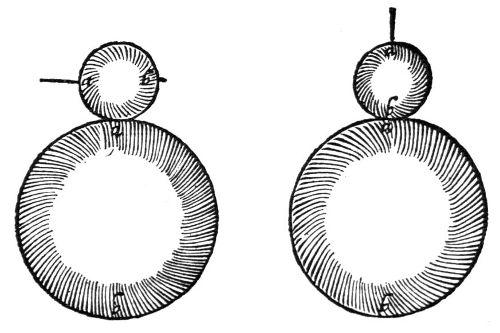exaltation of the power of the magnet.
o ne loadstone far surpasses another in power, since one draws iron of almost its own weight, another can hardly stir some shreds. whatever things, whether animals or plants, are endowed with life need some sort of nourishment, by which their strength not only persists but grows firmer and more vigorous. but iron is not, as it seemed to cardan and to alexander aphrodiseus, attracted by the loadstone in order that it may feed on shreds of it, nor does the loadstone take up vigour from iron filings as if by a repast on victuals. since porta had doubts on this and resolved to test it, he took a loadstone of ascertained weight, and buried it in iron filings of not unknown weight; and when he had left it there for many months, he found the stone of greater weight, the filings of less. but the difference was so slender that he was even then doubtful as to the truth. what was done by him does not convict the stone of voracity, nor does it show any nutrition; for minute portions of the filings are easily scattered in handling. so also a very fine dust is insensibly born on a loadstone in some very slight quantity, by which something might have been added to the weight of the loadstone but which is only a surface accretion and might even be wiped off with no great difficulty. some think that a weak and sluggish stone can bring itself back into better condition, and that a very powerful one also might present it with the highest powers. do they acquire strength like animals when they eat and are sated? is the medicine prepared by addition or subtraction? is there anything which can re-create this primary form or bestow it anew? and, certes, nothing can do this which is not magnetical. magneticks can restore a certain soundness to magneticks (when not incurable); some can even exalt them beyond their proper strength; but when a body is at the height of perfection in its own nature, it is not capable of being strengthened further. so that that imposture of paracelsus, who affirms that the force and virtue can be increased and transmuted tenfold, turns out to be the more infamous. the method of effecting this is as follows, viz., you make it semi-incandescent in a fire of charcoal (that is, you heat it very hot), so that it does not become red-hot, however, and immediately slake it, as much indeed as it can imbibe, in oil of saffron of mars, made from the best carynthian steel. "in this way you will be able so to strengthen a loadstone that it can draw a nail out of a wall and accomplish many other like wonderful things, which are not possible for a common loadstone." but a loadstone thus slaked in oil not only does not gain power, but suffers also a certain loss of its inborn strength. a loadstone is improved if polished and rubbed with steel. buried in filings of the best iron or of pure steel, not rusty, it preserves its strength. sometimes also a somewhat good and strong one gains figure some strength

when it is rubbed on the pole of another, on the opposite part, and receives virtue. in all these experiments it is an advantage to observe the pole of the earth, and to adjust according to magnetick laws the stone which we wish to strengthen; which we shall set forth below. a somewhat powerful and fairly large loadstone increases the strength of a loadstone as it does of iron. a loadstone being placed over the boreal pole of a loadstone, the boreal pole becomes stronger, and an iron rod (like an arrow) sticks to the boreal pole a, but not at all to the pole b. the pole a also, when it is at the top in a right line with the axis of both loadstones joined in accordance with magnetick laws, raises the rod to the perpendicular, which it cannot do if the large loadstone be removed, on account of its own weaker strength. but as a small iron globe, when placed above the pole of a terrella, raises the rod to the perpendicular, so, when placed at the side, the rod is not directed towards the centre of the globe, but is raised obliquely and cleaves anywhere, because the pole in a round piece of iron is always the point which is joined most closely to the pole of the terrella and is not constant as in a smaller terrella. the parts of the earth, as of all magneticks, are in agreement and take delight in their mutual proximity; if placed in the highest power, they do not harm their inferiors, nor slight them; there is a mutual love among them all, a perennial good feeling. the weaker loadstones are re-created by the more powerful, and the less powerful cause no harm to the stronger. but a powerful one attracts and turns a somewhat strong one more than it does an impotent one. because a strenuous one confers a stronger activity, and itself hastens, flies up to the other, and solicits it more keenly; therefore there is a more certain and a stronger co-action and cohærency.
